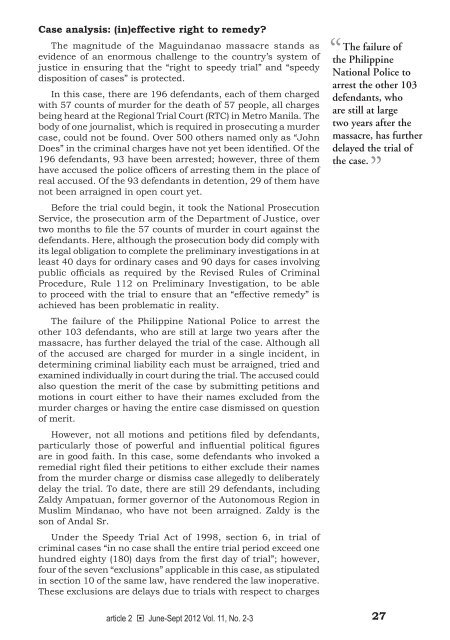Create successful ePaper yourself
Turn your PDF publications into a flip-book with our unique Google optimized e-Paper software.
Case analysis: (in)effective right to remedy?<br />
The magnitude of the maguindanao massacre stands as<br />
evidence of an enormous challenge to the country’s system of<br />
justice in ensuring that the “right to speedy trial” and “speedy<br />
disposition of cases” is protected.<br />
In this case, there are 196 defendants, each of them charged<br />
with 57 counts of murder for the death of 57 people, all charges<br />
being heard at the Regional Trial Court (RTC) in metro manila. The<br />
body of one journalist, which is required in prosecuting a murder<br />
case, could not be found. Over 500 others named only as “John<br />
Does” in the criminal charges have not yet been identified. Of the<br />
196 defendants, 93 have been arrested; however, three of them<br />
have accused the police officers of arresting them in the place of<br />
real accused. Of the 93 defendants in detention, 29 of them have<br />
not been arraigned in open court yet.<br />
Before the trial could begin, it took the national Prosecution<br />
Service, the prosecution arm of the Department of Justice, over<br />
two months to file the 57 counts of murder in court against the<br />
defendants. here, although the prosecution body did comply with<br />
its legal obligation to complete the preliminary investigations in at<br />
least 40 days for ordinary cases and 90 days for cases involving<br />
public officials as required by the Revised Rules of Criminal<br />
Procedure, Rule 112 on Preliminary Investigation, to be able<br />
to proceed with the trial to ensure that an “effective remedy” is<br />
achieved has been problematic in reality.<br />
The failure of the Philippine national Police to arrest the<br />
other 103 defendants, who are still at large two years after the<br />
massacre, has further delayed the trial of the case. Although all<br />
of the accused are charged for murder in a single incident, in<br />
determining criminal liability each must be arraigned, tried and<br />
examined individually in court during the trial. The accused could<br />
also question the merit of the case by submitting petitions and<br />
motions in court either to have their names excluded from the<br />
murder charges or having the entire case dismissed on question<br />
of merit.<br />
However, not all motions and petitions filed by defendants,<br />
particularly those of powerful and influential political figures<br />
are in good faith. In this case, some defendants who invoked a<br />
remedial right filed their petitions to either exclude their names<br />
from the murder charge or dismiss case allegedly to deliberately<br />
delay the trial. To date, there are still 29 defendants, including<br />
Zaldy Ampatuan, former governor of the Autonomous Region in<br />
muslim mindanao, who have not been arraigned. Zaldy is the<br />
son of Andal Sr.<br />
under the Speedy Trial Act of 1998, section 6, in trial of<br />
criminal cases “in no case shall the entire trial period exceed one<br />
hundred eighty (180) days from the first day of trial”; however,<br />
four of the seven “exclusions” applicable in this case, as stipulated<br />
in section 10 of the same law, have rendered the law inoperative.<br />
These exclusions are delays due to trials with respect to charges<br />
article 2 � June-Sept 2012 Vol. 11, No. 2-3<br />
“<br />
The failure of<br />
the Philippine<br />
National Police to<br />
arrest the other 103<br />
defendants, who<br />
are still at large<br />
two years after the<br />
massacre, has further<br />
delayed the trial of<br />
the case.<br />
”<br />
27


